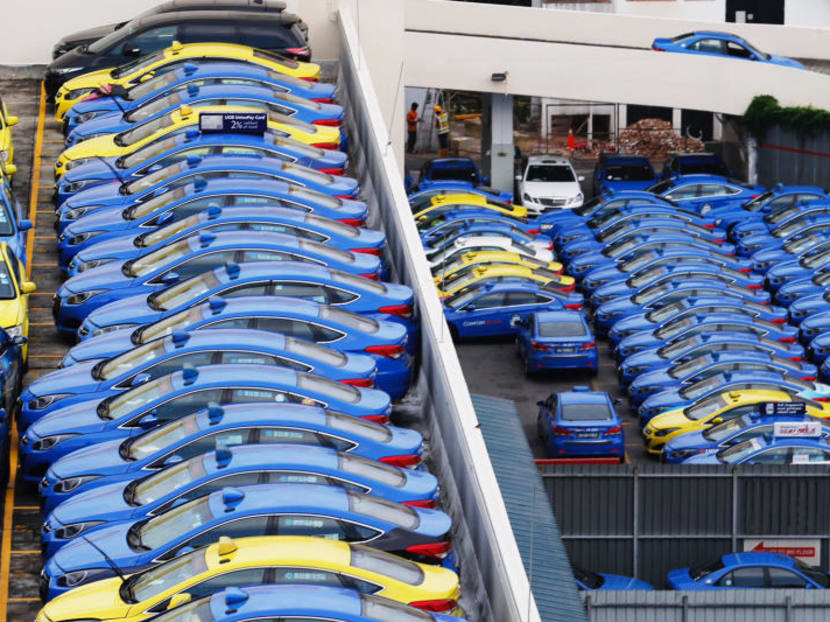ComfortDelGro's taxi fleet sinks to lowest in 8 years, as Grab recruits over 3,000 drivers to its platform
SINGAPORE — Continuing a recent trend, the overall number of cabs here as well as those on the books of ComfortDelGro, Singapore’s largest taxi operator, have fallen to new multi-year lows in August, latest official statistics showed.

Comfort and CityCab taxis parked at the CityCab Building on Sept 20, 2017. Photo: Najeer Yusof/TODAY
SINGAPORE — Continuing a recent trend, the overall number of cabs here as well as those on the books of ComfortDelGro, Singapore’s largest taxi operator, have fallen to new multi-year lows in August, latest official statistics showed.
The decline came in the face of an aggressive campaign by ride-hailing firm Grab to recruit ComfortDelGro's drivers by offering them heavily discounted rentals. The recruitment drive, which saw strong interest among the cabbies, ends on Saturday after three extensions in as many weeks.
Grab told TODAY on Friday (Oct 6) that more than 3,000 ComfortDelGro taxi drivers had joined its platform as part of the campaign, with the bulk signing up as private-hire car drivers.
ComfortDelGro had 15,127 Comfort and CityCab taxis — the lowest for the company since August 2009 — based on taxi population figures for August released by the Land Transport Authority (LTA) this week.
The number, which included cabs sitting idle, pointed to an eighth straight month of decline in ComfortDelGro's taxi fleet.
Since the start of this year, ComfortDelGro, which is facing an exodus of drivers to its rivals, has lost 1,368 cabs, or about 8.3 per cent of its fleet.
The overall number of taxis in Singapore, meanwhile, fell below the 25,000-mark for the first time in more than seven years. The last time this happened was in February 2010, when 24,846 taxis were recorded.
There were 24,863 taxis here as of August — a drop of 2,339 cabs since January.
All the taxi operators saw the size of their fleets shrink over the same period, except Premier Taxis, which registered a 2.7 per cent growth.
SMRT Taxis' fleet fell from 3,410 to 2,921, a 14.3 per cent drop. Trans-Cab saw its fleet decline about 11 per cent from 4,556 to 4,057, while Prime Taxi shed nine cabs, a 1.25 per cent dip. The number of cabs under the yellow-top scheme fell by 22.8 per cent.
However, the number of taxi driver’s vocational licences issued by the LTA rebounded to 152 in August, after hitting a low of 95 in July.
Still, the average number of licences issued monthly between January and August this year is nearly half of last year’s average. It stood at about 152 in the first eight months of this year, compared with 299 over the whole of last year.
The falling numbers have raised questions about the future of Singapore's taxi industry, and the fate of the key players.
Singapore University of Social Sciences (SUSS) transport expert Park Byung Joon said the smaller operators could decide to sell their business to the larger players eventually if their fleet size continued to shrink.
For ComfortDelGro, shedding 1,000 or 2,000 cabs would not push it to a “critical point”, given that the company still has the largest taxi fleet here. But losing cabs on such a scale is “very bad” from the business standpoint, Dr Park added.
And with signs that Grab and rival ride-sharing firm Uber would continue splashing funds to cement their presence here, the downward trend for ComfortDelGro's fleet size may continue, he said.
Fellow SUSS transport expert Walter Theseira further suggested that there is no compelling reason for ComfortDelGro to maintain more than 10,000 taxis, having lost the advantage of scale since Grab and Uber started operations in the Republic about four years ago.
ComfortDelGro’s scale had once given it the ability to match riders and drivers more reliably. But without an app that could reach drivers from other operators, there was no "market advantage” for ComfortDelGro to continue to run a large fleet, Dr Theseira argued.
Despite the disruptions, the Singapore market can continue to support several taxi firms, the two experts said.
Dr Park said, for instance, that a company could operate as few as 100 cabs and still do sustainable business.
But these cab companies are now “nothing more than vehicle fleet providers”, warned Dr Theseira, adding that the role of taxi operators as booking system providers has been taken over completely by the ride-hailing apps.











